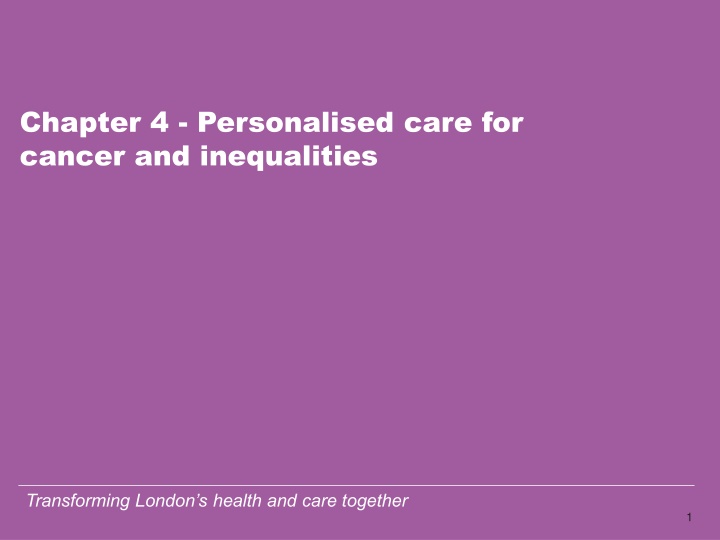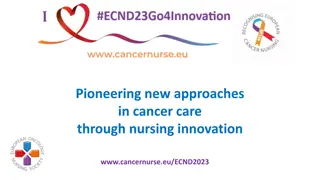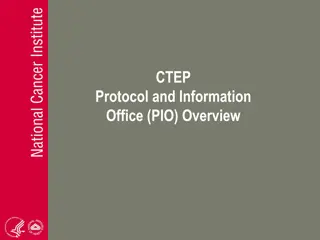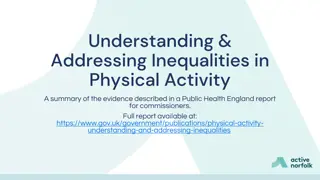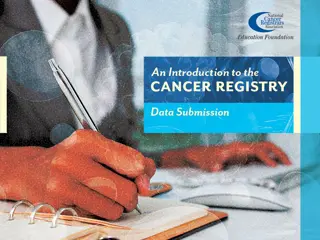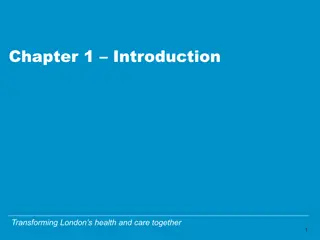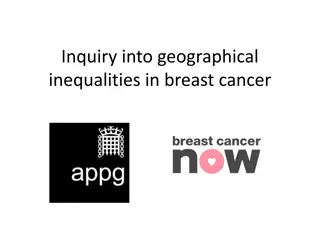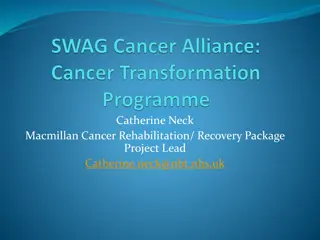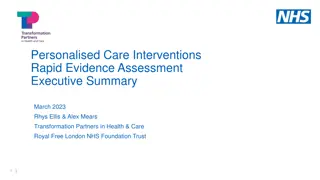Addressing Inequalities in Personalised Cancer Care in London
This chapter highlights the importance of personalised care in cancer treatment, focusing on addressing inequalities in London's healthcare system. It discusses factors such as socio-economic status, access to services, and post-treatment care experiences through data and surveys. The content underscores the need for improved support systems and tailored approaches to ensure equitable care for all cancer patients in London.
Download Presentation

Please find below an Image/Link to download the presentation.
The content on the website is provided AS IS for your information and personal use only. It may not be sold, licensed, or shared on other websites without obtaining consent from the author.If you encounter any issues during the download, it is possible that the publisher has removed the file from their server.
You are allowed to download the files provided on this website for personal or commercial use, subject to the condition that they are used lawfully. All files are the property of their respective owners.
The content on the website is provided AS IS for your information and personal use only. It may not be sold, licensed, or shared on other websites without obtaining consent from the author.
E N D
Presentation Transcript
Chapter 4 - Personalised care for cancer and inequalities Transforming London s health and care together 1
Personalised care & inequalities outline Personalised care London picture Why are inequalities in personalised care important? What do cancer patients think? What should the pathway look like? Key milestones Care plans Primary care (training gaps, registers, structured approach) comorbidity Rehabilitation services in London for cancer Variation in access to psycho-oncology support Variation in access to lymphoedema services Social care needs and cancer Debt and cancer Wigs and prostheses New quality of life metrics for cancer (NHSE) 2
Personalised care London picture Half of all people living with cancer in the 40% most deprived quintiles 3
Why are inequalities in personalised care important? People with the lowest incomes: People living with cancer in the most socio-economically deprived areas faced almost 25% more emergency admissions in their last year of life compared to people from the least deprived areas are almost twice as likely to report a need for more emotional support are twice as likely to want more practical support inside the home are three times more likely to Macmillan Inequalities Time to Talk report need practical support outside the home than people with a higher income. 4
What do cancer patients think? Care and support after cancer treatment finished (Q51) National cancer patient experience survey (NCPES) 2017 Q51 Once your cancer treatment finished, were you given enough care and support from health or social services (for example, district nurses, home helps or physiotherapists)? Nationally Deprivation The biggest difference between the least and most deprived groups 48% of respondents from the least deprived group gave a positive response, compared to 43% of respondents from the most deprived group. Ethnicity The biggest difference is on question 51, where 46% of white respondents gave a positive response, compared to 31% of black respondents In London Updated results for London Q51 42% white and 33% BME felt happy with the social support provided to them after discharge 5
What do cancer patients think? Analysis of London electronic holistic needs assessment data (2017): Top 10 concerns 1. Worry fear or anxiety 6. Moving around (walking) 2. Tired, exhausted or fatigue 7. Work or education 3. Pain or discomfort 8. Sadness depression 4. Eating, appetite or taste 9. Money or housing 5. Sleep problems 10. Difficulty making plans 6
What should the pathway look like? Key milestones Key milestones on the cancer pathway Personalised care which comprises: 1.Holistic needs assessment (in hospital) across 4 domains and care plan 2. Treatment summary 3. Cancer care review (in the community, but not specified under Quality Outcomes Framework (QOF) there are no quality standards) 4.Stratified follow up make sure that patients get onto the best follow up pathway for their cancer 7
What should the pathway look like? Care planning Variation between trusts in whether they do electronic needs assessments 8
What should the pathway look like? Primary care 1. Training gaps 2. Registers A London training needs assessment for primary care (2016) : There is a discrepancy between QOF and cancer registries meaning GPs not always able to follow up patients as they are unaware they have cancer 46% of GPs felt clear/very clear in their role of supporting people after active treatment for breast, colorectal and prostate cancer. Only 39% of nurses felt clear/sometimes clear in their role. 3. Structured approach Annual multi-morbidity reviews should be the norm, recommended by NICE guideline 56 More than half of GPs and nurses were unsure about consequences of treatment, such as cardiovascular and bone health. NCPES data show that patients do not always know they have a care plan There is variation in cancer care reviews: some CCGs commission these, great variation 45% of GPs had received a little training in the last 3 years and only 26% of nurses had completed a cancer specific module or looked at resources in the last 3 years. Cancer has late effects risk of recurrence or new primary cancer. Primary care not likely to do routine follow up as not commissioned 9
What should the pathway look like?co- morbidities 100% % of Prevalent Cases 2007 - 80% 60% 40% 2014 20% 0% 1 2 3 4 5 1 2 3 4 5 1 2 3 4 5 1 2 3 4 5 1 2 3 4 5 1 2 3 4 5 1 2 3 4 5 North Central London STP North East London STP Deprivation Quintile: 1 = Least Deprived 5 = Most Deprived 0 1 North West London STP South East London STP South West London STP West Essex (WE) London + WE 2 3+ Varies with age i.e.as expected more comorbidity with increasing age. 12% cancer patients overall have comorbidity 6% of under 60s to 25% of over 80s. Very likely under-reporting as only reflect those people with hospital admission due to co-morbidity estimated as 70% of patients have a comorbidity (MacmIllan) 10
Rehabilitation services for cancer Mapping of Pan-London Cancer Rehabilitation Services due to be published in July 2019 Shows all services in London There is also a directory of services for cancer patients the cancer care map (this is in development): will be a great resource for primary care and patients to access services in local areas www.Cancercaremap.org 11
Variation in psycho oncology services London Psycho-oncology is a multi-disciplinary speciality focusing on the psychological and mental health care of people affected by cancer, carers and families, contributing through direct and indirect care to improving clinical outcomes, patient experience and quality of life (TCST May 2018) Mapping of psycho-oncology support in November 2017 showed gaps in: Chelsea and Westminster (includes West Middlesex) Princess Alexandra (West Essex) Epsom St Helier Hospital* * in discussions April 2019 12
Variation in lymphoedema services Mapping by TCST 2016 Using estimates of 1.33 persons with Lymphoedema per 1000 population (ca and non ca) = 11,700 people Gaps all over London: NWL: Brent, Harrow and Hounslow SWL: Croydon SEL: Bromley and Lambeth NEL: BHR NCL: Barnet Fragmented commissioning by CCG, NHSE or charities 13
Personalised care household bills arrears GLA data 2018- 19 Recent data from the GLA survey highlight the London assembly areas with highest levels of people living with household bills arrears. Per cent of households with household bills arrears GLA 2018-19 12 10 8 Percent (%) 6 4 2 0 14
Social care and cancer Chitris et al May 2014 Nuffield Report Paper takes a wider look at cancer survivorship. Inclusion of very important aspects beyond physical comorbidity described as emotional and practical needs , including activities of daily living (ADLs) Macmillan model first trialled in Glasgow. Reviewed and supported almost 2500 patients since 2014. Top 3 concerns were: money and housing, fatigue and getting around Studied over 8000 people with a diagnosis of cancer in two areas of England. Found that only 10% of new diagnoses had a social services assessment and in the year after diagnosis only 10% had SS support Dedicated housing professional on the team, who has so far prevented 26 people becoming homeless . Dealing with issues in one place through one person model Caveats it is the gap between observed and expected but assessments ideally should be much higher Improving the cancer journey more than the sum of its parts . Edinburgh Napier University Snowden and Young May have changed very positively since the Care Act 2014 (need to repeat the study) Increased use of Social services with comorbidities https://www.nuffieldtrust.org.uk/research/use-of- health-and-social-care-by-people-with-cancer 15
Wigs/prostheses Recent event Black Women Rising event support group / awareness event for BAME women with cancer (most of which were Breast cancer patients) issue of lack of appropriate wigs and prosthesis for breast cancer came up. 5727 new breast cancer diagnoses in London 2017 if 41% BAME this is potentially affecting 2348 women per year In terms of prostheses, women feel that the skin tone they are given is completely inappropriate.: either very dark or they have to settle with the similar tone given to White /Caucasian women. With wig provision, lack of variety of stock and assuming that the same stock of synthetic wigs will suffice for all BAME women. Anita (one of the main manufacturers of breast prosthesis) Austria says they find it difficult to get the right skin-tone colours to match BAME women. Main manufacturers Anita, NicolaJane and Zelima Issues no clear commissioning routes, comes in the tariff for each trust via the appliance office. Case study In one instance, the patient said she was given an inappropriate wig (she had curly hair). After 3 attempts to get the supply from the trust she was being treated at with no success, she requested to be given a voucher or be reimbursed to purchase it herself which was almost like a tug of war. Finally she found a suitable Wig online for herself. 16
Measuring improvements - New quality of life metric planned national NHSE cancer This will capture people s experience of living with cancer more fully The QoL pilotprojectaims to: evaluate data collection methods gather data to develop summary QoL metric(s). The project is underway in five Cancer Alliances working in eight hospital Trusts: Breast, prostate and colorectal cancer patients are included. The goals is to collect a minimum of 1000 patient questionnaires. Patients are recruited between 12-24 months after the end of treatment. Electronic and paper questionnaires are in use. The two electronic data collection platforms currently in use are: My Medical Record eHNA From NHSE slides 17
Personalised care Summary Recommendations Why are inequalities important? - Increased emergency admissions for people in more deprived groups, and reflected in patient surveys Ensure primary care registers are up to date, so that primary care can support all people following a cancer diagnosis Populate the cancer care map so that GPs and patients know how to access local services/support Pathways Much variation in holistic care assessments Much variation in primary care registers and whether commissioned to do cancer care reviews Ensure equal access to rehab: including all trusts have psychosocial offer equitable lymphoedema commissioning and provision in order to prevent more costly worsening of the conditions Variation in rehabilitation psycho- oncology, lymphoedema and social care assistance Variation in access to appropriate wigs and prostheses Address wig/prosthetic gaps for Black and minority ethnic patients Potential links to social prescribing work across London 18
List of abbreviations ADL activities of daily living BBV Blood borne virus CCG Clinical commissioning group eHNA electronic health needs assessment eRS electronic referral system GI Gastrointestinal GMS1 General medical services GP contract GP General Practitioner HPV Human papilloma virus IVDU Intravenous drug user LD Learning disability LTP NHS Long Term Plan (2019) NCIN National Cancer Intelligence Network NCL North Central London NCPES National cancer patient experience survey NEL North East London NWL North West London Office for National Statistics (ONS) Public Health England Fingertips data SEL South East London STP Sustainability and transformation partnership SWL South West London TA Temporary accommodation TCST Transforming cancer services team 2WW Two week wait 19
